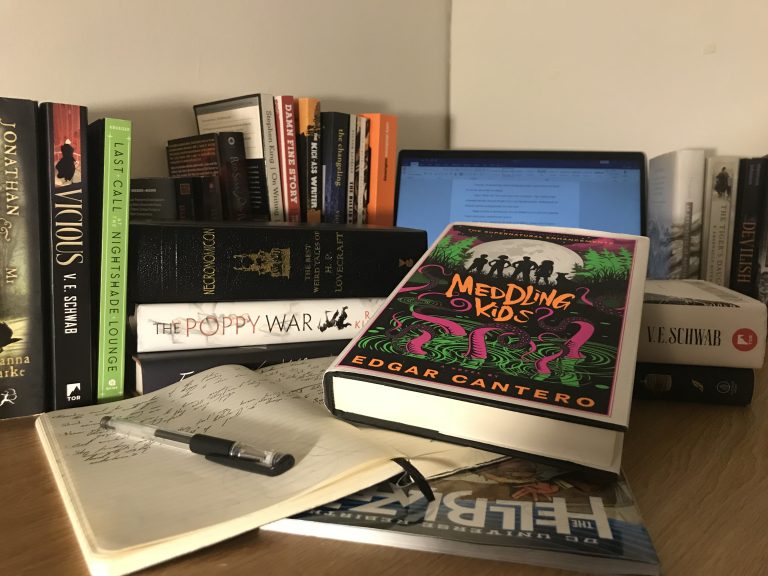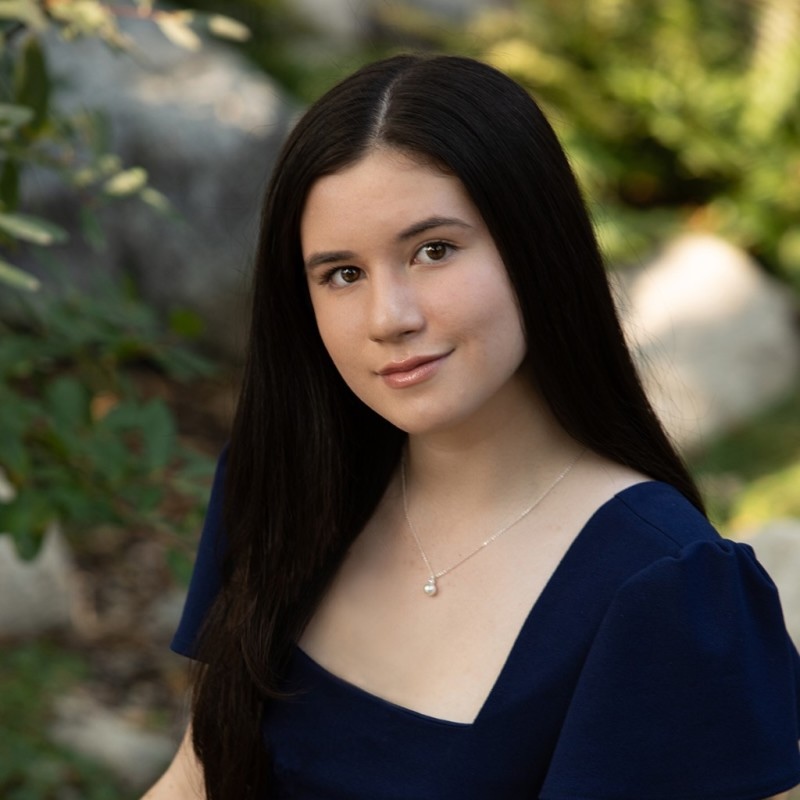Author For The Summer: Dakota Griffin ’19 Writes A Fantasy Novel
By Cameron Chertavian
She often writes at the desk in her room and allows time for a gentle start to the day. “I don’t have a nine to five, so I can drag my feet a little bit, eat breakfast.”
Griffin, an English major and recipient of a Bowdoin summer grant, the Surdna Undergraduate Research Fellowship, has devoted her summer to crafting a fantasy novel. The fellowship, one of more than 200 awarded to Bowdoin students this summer, lets her pursue her passion full time, something she has never done before. “I have been able to put all my and energy into it, which is a fantastic feeling, something a lot of writers don’t get,” Griffin said. “Most people in the US who write have a full-time job, and then they write books.”
Griffin’s book mixes fantasy and reality to tell the story of 24-year-old Victor Cruz, a magic-less man in a world of modern-day magicians. “So everyone is walking around with an iPhone and Facebook, but most people can summon fire in their hand,” explained Griffin. Faced with trouble at home, Victor decides to sell his soul to a mysterious being in exchange for the powers he never had. This ends as badly as one would expect, and Victor must reunite with his old high school friends in an attempt to save his life.
As Griffin describes it, the idea for the novel came to her while driving home to Mahwah, New Jersey from Bowdoin: “I was thinking about how if something went bad at home, I would have to drop out. My brain, because I always wrote stories, began to spin that. How can I turn this from a dark anxiety in the back of my head into something productive?” Griffin said. This, along with her interest in the fantasy genre, lead to the line that helped inspire the book: “Yeah, I dropped out of grad school to help my best friend, who sold his soul to a monster, but what else are friends for?”

The book uses wit and tongue-in-cheek humor to make light of Victor’s grim situation. Griffin feels this is crucial to the tone of the novel: “Even when we are facing the darkest and harshest moments of our lives, they are not devoid of humor. Our friends are still making stupid jokes and we are still trying to make things brighter than they seem. So comedy is important.”
While Griffin’s job may allow her a greater degree of freedom than most research fellows, she has to get inventive to ensure her productivity stays high. She was inspired by a favorite writer, Victoria Schwab, to maintain a “star chart” which she fills out daily. “You literally take those foil stars that you have in third-grade classrooms,” Griffin said. When she writes 500 words, she gives herself a gold star. When she reads fifty pages in books suggested by her advisor, she gets a silver star. “Being able to stick the stars on the stupid poster at the end of the day really helps with accountability,” she said.
Griffin has always considered writing a possible career but did not start creative writing at Bowdoin until after her junior-year abroad program in England, when she had a one-on-one tutorial with a British author, and took a speculative fiction class. After returning to campus, she doubled down on her creative writing aspirations and secured the summer fellowship to write.
“Oh yeah, this is the dream,” said Griffin. “If I could do nothing but write books all day long for the rest of my life, I would be really happy.”
An excerpt from Dakota Griffin's novel
Trial and error told him one batch of dirt was a five-gallon bucket, which made one gram of gold and required a thirty-minute nap to recuperate before the next batch. If there was a formula to determine base material to gold ratios, Victor didn’t know it. He doubted anyone did, since he was apparently the only person to ever manage the transmutation.
He was curled up in the truck’s passenger seat in the middle of one of these recuperative naps when his phone rang. Eyes bleary with sleep, he reached for the center console, groping for his phone. His thumb slid across the screen, taking the call, before he fully processed the caller ID.
The name hit him the same moment the greeting did.
“Vic?” Tess’s voice, surprised and tired, any shock drowned out by too many sleepless nights.
Shit. His thumb hovered over the little red hang-up button.
“Hey, are you there? Did you…not butt-dial, but the opposite? Butt-pick-up? Victor?”
Victor let his thumb fall away from the button and brought the phone to his ear. Tess, who had been coming to his defense since Will Sitzler tried to steal the light-up robot toy from him during free play in kindergarten, didn’t deserve getting hung up on, and while she might be willing to forgive him for it, he wouldn’t forgive himself.
“Nah, Tess, I’m here,” he said, shifting into a more comfortable position in the truck’s passenger seat. He rubbed his eyes and stared out through the windshield into the wide, seemingly endless expanse of the woods. “What’s going on?”
“That’s weird.” It sounded like she’d just seen something or realized something, like she wasn’t completely listening to him. Fair, all things considered.
“What’s weird?”
“My best friend who’s hardly answered my texts or calls for the past two months thinks he gets to ask me what’s going on, like I’m the one who’s been acting like a Soviet spy.”
Harsh, but not untrue. Classic Tess. “The Cold War ended before we were even born.”
“I know when the Cold War ended.”
Victor didn’t know what to say to that, other than that he knew she knew, and that was hardly productive. He surveyed the trees and listened to Tess’s special brand of razor-sharp silence. He imagined her hurrying through the streets of Boston—Cambridge?—blonde hair coming loose from a bun, grey pea coat collar flipped up against the cold, dialing his number between class and the library more out of habit than anything else, probably not even expecting him to pick up.
“So, what’s new with you?” he asked after a moment.
“Seriously?” Victor would have bet all the gold he’d transmuted that day that Tess was rolling her eyes at him.
“I mean, you’re not asking me.”
“I don’t know where to start, Vic.” She sighed. “Are you okay, at least?”
He considered his answer, thinking about the dirt and the gold in the back of the truck, his mother at home with her slowly receding cancer, the rush of exhaustion when he imagined her the way she’d been before she got sick and let the magic flow from him to her, the fact that he could do magic at all. “Yeah, actually. Better than usual.”



